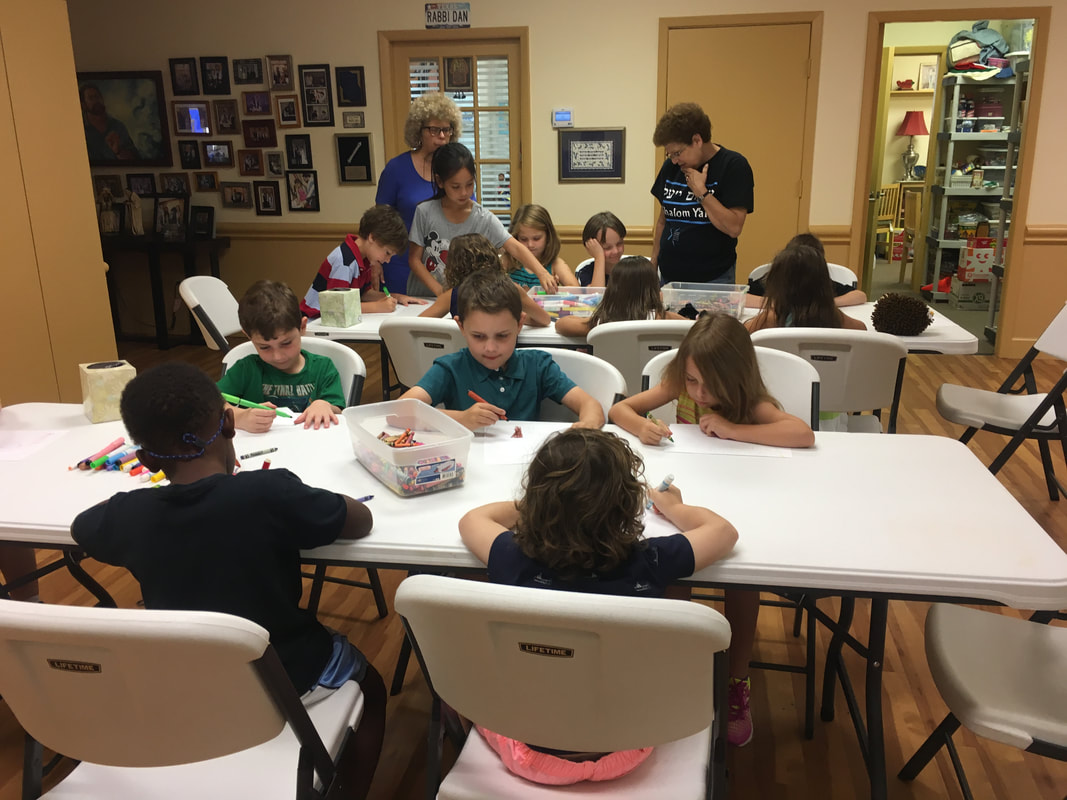Return to Education Newsletter main page! |
Teaching Children about Elul?!By Leah Wittenberg, Lawrence Magdovitz ISJL Education Fellow
When I think of Elul, other lesser known Jewish traditions and holidays come to mind: rosh chodesh (the beginning of a new month and new moon), hoshanah rabah (the day on which the judgement, which began on Rosh Hashanah, is sealed), sh’mini atzeret (when we recite yizkor - the memorial prayer - and pray for rain after sukkot), and tu b’Av (the Jewish/Israeli Valentine’s Day). We don’t usually teach our students, especially the younger ones, about these customs. But there is no real reason why not to do so. Especially because of the way the Jewish calendar is playing out this year, Rosh Hashanah and Yom Kippur fall in late September. This gives you the perfect amount of time to teach your students about all of the gems of Elul. Keep reading to discover some tips and tricks for how to successfully teach children of all ages about this preparatory month. 1. Blowing the shofar Most kids are familiar with the shofar, and are used to hearing it on Rosh Hashanah and at the end of Yom Kippur. But you can stretch out this tradition and teach about the shofar even before the holidays officially start. You can engage kids in this sensory experience at the beginning of every class lesson during the month of Elul by having someone blow the shofar or by having students blow toy shofars on their own. They will then associate the whole month with the High Holidays, which is one of the goals of Elul. 2. Stretching bodies and minds Elul is a very spiritual month, which can seem like a difficult topic for children to understand, but there are ways to make it easier. You can use stretching and yoga for younger children, and meditation for older children and teens as a teaching technique. In any case, in order to get the most out of the activity spiritually, choose a room that will be quiet, dark, and comfortable. Encourage students to focus on their breathing and for younger kids, active stretches such as wind milling arms or touching toes might work better. If you make the connection between stretching our bodies to warm them up for the High Holidays and stretching our minds to get ready to forgive people and start anew, your students will be enacting spiritually without even realizing it. For older students, a longer meditation might be useful. Ask your Fellow for some of our suggestions! 3. Interpreting Psalm 27 It is customary to read Psalm 27 every day during the month of Elul. Because it’s probably not the best idea to have kids read: “When evil people draw near to devour my flesh - it is these foes and enemies who stumble and fall,” you can engage them in the text differently. The second half of the psalm focuses on oneness and even quotes the sh’mah, so you can say the sh’mah with your students before or after the shofar blowing to signify the oneness of the psalm and God. For older children, you can read to them or have them read part of the psalm and have them either draw or write their own interpretation of it. A good part to use for this could be: “Even if an army rises up against me, my heart will have no fear! Even if a whole war besets me, I will still feel secure. One thing I ask from Adonai, one thing I seek: to dwell in Adonai's house all the days of my life, to gaze upon the beauty of Adonai, to explore Adonai's sanctuary.” 4. Writing personal letters For students who are able to write, have them write a letter to themselves that is for their eyes only. Instruct students to write about their goals for the Jewish New Year, including any resolutions, reflections on the past year, and ideas about forgiveness they may have. Collect the letters in sealed envelopes and keep them somewhere safe until the end of the High Holidays. Return the letters to your students after sukkot and see if they were able to achieve their “New Year’s Resolutions” and achieve forgiveness. 5. Elul meditation Forgiveness is obviously a huge part of the High Holidays, but pardoning someone or asking for forgiveness doesn’t happen in a day. Elul is the time when you can really start to think about repentance, even at a young age. Tots and young children can have their hands traced on construction paper, and then cut out the outlines of their hands. Simply paste the hand cutouts onto a new, blank piece of construction paper and write the following: “One, two, three, four, five I’m waiting until my anger subsides Six, seven, eight, nine, ten If I’m still upset I’ll count again” You can practice counting with your students and students can use this technique to forgive people who may have hurt them. |
- Home
- WHO WE ARE
-
WHAT WE DO
- PODCAST
- Conference >
- Education >
-
CULTURE
>
- Culture Overview
- Cultural Programming >
-
History
>
-
Encyclopedia of Southern Jewish Communities
>
- Alabama Encyclopedia
- Arkansas Encyclopedia
- Georgia Encyclopedia
- Florida Encyclopedia
- Kentucky Encyclopedia
- Louisiana Encyclopedia
- Mississippi Encyclopedia
- North Carolina Encyclopedia
- Oklahoma Encyclopedia
- South Carolina Encyclopedia
- Tennessee Encyclopedia
- Texas Encyclopedia
- Virginia Encyclopedia
- Encyclopedia Credits
- Oral History
-
Encyclopedia of Southern Jewish Communities
>
- SPIRITUALITY >
- DONATE
- Shalom Y'all
- Strategic Plan
- Southern & Jewish Blog
- Calendar
- Virtual Press Kit
|
©2024 Goldring/Woldenberg Institute of Southern Jewish Life
|

